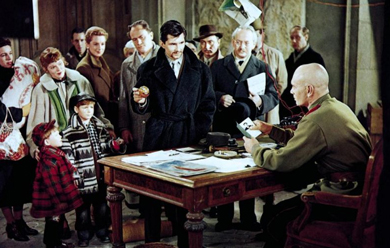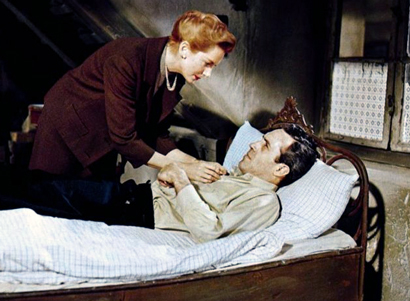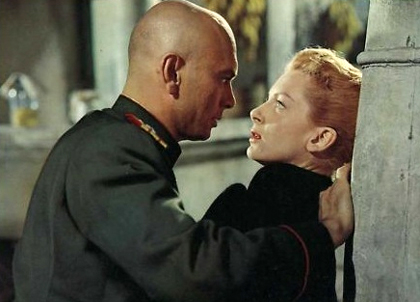
 |
|
|
|
The Journey is a fairly unusual Cold War drama from the 1950s. Out of the tragedy of the Soviet Union's invasion of Hungary (1956) comes a story about a group of foreigners prevented from exiting Budapest across the western frontier into Austria. The big draw for audiences was surely the star reunion of Deborah Kerr and Yul Brynner. After their grand success in The King and I, expectations were high for the fiery romance denied in the R&H musical. In The Journey, the mysterious & masculine Brynner even asks Ms. Kerr to dance. The film's "Alby Productions" may be an acronym for "Anatole Litvak Brynner Yul". By this time in his career, Yul Brynner was expanding his involvement in movies, as an investor and as a director. 
Playwright George Tabori's screenplay is reminiscent of a Val Lewton/Robert Wise film from WW2 called Mademoiselle Fifi, which was suggested by the same De Maupassant story source as John Ford's Stagecoach. In wartime, an enemy officer delays a group of travelers, because he is attracted to a female passenger among them. In The Journey, Major Surov (Yul Brynner) is stuck patrolling the Austrian border while other Russian forces battle the resistance in Budapest. He's about to pass a busload of foreigners when two of them hold his attention. American Paul Fielding (Jason Robards, Jr., in his first film) draws Surov's suspicions, as does Lady Diana Ashmore (Deborah Kerr), who insists that she just met Fielding yet seems strongly attached to him. Group spokesman Hugh Deverill (Robert Morley) tries to maintain a diplomatic peace. The harsh Surov keeps tensions high, while the passengers become alarmed when they find out that Paul's real identity could land them all in big trouble. Major Surov stalls, and sends mixed signals to Lady Diana. He discovers that Paul is really Paul Kedes, a Hungarian wounded in a street battle, yet doesn't arrest the couple. Discouraged by the hatred of the Hungarians and unhappy that the foreigners fear and shun him, Surov reaches out for affection to the group and to Diana in particular. With the help of the innkeeper Csepege (Kurt Kasznar), Diana and Paul make midnight plans to flee across a lake to Austria. 
The Journey is an effective drama with good roles for Deborah Kerr and especially Yul Brynner. He makes an impressive army officer smoldering with passion for the "English Rose" that passes through his headquarters. Anatole Litvak may not be associated with many bona fide classics but his films were always well directed and often quite intelligent. The Hungarian-born director was a major contributor to the "Why We Fight" series executive- credited to Frank Capra. His highly recommended WW2 thriller about the collapse of Nazi Germany Decision Before Dawn doesn't avoid the political complexities of its subject. The Journey takes some dramatic license with the Hungarian situation, but American audiences of 1959 were probably not terribly well informed about the plight of Eastern Europeans. Litvak's film was surely not distributed behind the Iron Curtain, where it would probably not amuse Hungarians suffering under the Russian occupation. Yul Brynner's Major talks tough but has gone almost absurdly soft and emotional for love of Lady Diana. The relationship is handled well enough until one thinks of how foolish this is -- at the first sign of weakness an officer like Surov would be replaced. The idea that Surov would defy his orders, return weapons to known rebels and not put the fugitives under arrest just isn't believable. Setting spongy politics aside, the The Journey works quite well on its own terms. The film maintains a serious attitude about the Russian occupation, and the production is quite elaborate, with impressive Austrian locations and excellent sets for the village square and its alleys. Jack Hildyard's atmospheric cinematography uses dramatic lighting and morning mist to good effect. The European setting does not look like a Hollywood or London recreation. 
The superior cast is a major asset. Robert Morley is allowed to play his English diplomat as a thoughtful and perceptive fellow instead of one of his familiar clownish exaggerations. Morley's Deverill disapproves of Lady Diana's actions but doesn't try to dissuade her. E.G. Marshall and the excellent Anne Jackson play a nicely drawn American couple. They're also free of caricature, even when Jackson's pregnant wife takes the "Mademoiselle Fifi" argument to Lady Diana: "You know what Surov wants, give it to him!" She's simply trying to protect her own children. One of the tots is little Ron Howard, in what appears to be his first film role -- at age four. The kid is a pro from the get-go, drawing his cap gun on armed Russian troops and exchanging funny faces with them. Howard also seems to have good representation, as he's in the movie for about five minutes and gets 7th billing, at the head of the featured players. Jason Robards Jr. makes a less than grand debut, if only because he doesn't get a chance to wax romantic with Kerr. The role also requires him to deliver a fairly awkward "you will never defeat us" speech while Surov's doctor is removing a bullet from his shoulder. The whole scene is shaky -- Brynner's "ruthless" Major is offering Robards' character emotional support! It's altogether possible that Major Surov's enhanced sensitivity was mandated by Yul Brynner, to make his character the center of attention. This is how star power can distort otherwise great movies. 
Brynner is indeed the center of attention, and since he's what the ladies came to see, it's difficult to argue with the choice. The Journey shows the Russian troops acting mostly in a civil manner, singing as they march. They seem a swell bunch of guys when relaxing in their billet room, pouring the crestfallen Surov a drink, etc. I understand that the actual Russian Army offers a slightly more brutal lifestyle. The final surprise is at the periphery of the drama. Tabori and Litvak have written in an Innkeeper's daughter who seems to be Surov's former main squeeze, and who might have informed on Diana out of jealousy. The escape is so strongly telegraphed that a Judas is hardly necessary. Among the villagers / freedom fighters is Eva, a statuesque beauty even in a heavy coat. She's played by future star Anouk Aimée, and would turn heads anywhere. One look at Eva's dead-eye stare at Major Surov, and one can guess the ending of the movie. The IMDB says that another future woo-bait European star, Senta Berger, is a waitress at the inn. I didn't catch her. 
The Warner Archive Collection DVD-R of The Journey looks great. Old TV prints were faded and grainy but the WAC delivers a polished presentation with great color -- lots of moody pastels -- and good definition. Deborah Kerr and Yul Brynner fanciers will be pleased. The trailer is a faded print used for recording the voiceover narrator. It is marked in several places with greasepaint lines that serve as a demonstration of how looping sessions were performed. Just before each new 'clump' of narration, a grease pencil line sweeps across the frame. When it gets to the right side, that's the cue for the voice talent to start talking.
On a scale of Excellent, Good, Fair, and Poor,
The Journey rates:
Reviews on the Savant main site have additional credits information and are often updated and annotated with reader input and graphics. Also, don't forget the 2011 Savant Wish List. T'was Ever Thus.
Review Staff | About DVD Talk | Newsletter Subscribe | Join DVD Talk Forum |
| ||||||||||||||||||